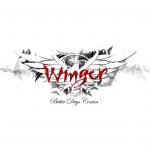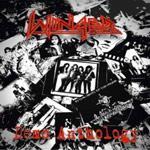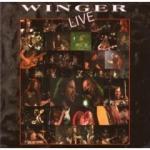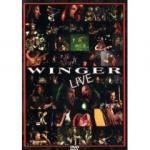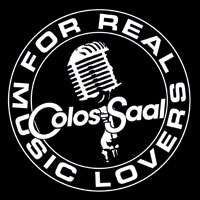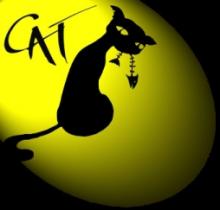Band:
BiografieThroughout the years I have read all sorts of things about my personal history, and the history of my band, Winger. Most of it was inaccurate and taken out of context. For this reason I decided to write my own story.Winger
I was born in Denver, Colorado in 1961. My parents were weekend musicians, and when a sitter was unavailable, my brothers, Paul, Nate, and I, went along, stayed in the dressing room, and listened to their jazz trio. These are my earliest memories of music. At the age of 5, I was enrolled in a pilot Yamaha music program for preschoolers. Blessed with supportive parents, we were given music lessons and supplied with instruments. When I was 7 years old, my brothers and I and a neighborhood friend, Pete Fletcher, started a band, "Blackwood Creek" I grew up listening to pop radio and what is now considered progressive rock. As a band our favorites were Yes, Jethro Tull, Uriah Heep, Rush, Black Sabbath, Led Zeppelin, Alice Cooper, C.S.N.Y, and, of course, the Beatles.
When I was 9, we did our first gig at our elementary school and later a few gigs at different schools. I made about $30 and considered myself "rolling in it." Over the next ten years, we saw rock, disco, punk, and new wave come and go. I left school after the tenth grade because I felt school was getting in the way of my education. Around that time, 1976, I became interested in classical music and started studying classical guitar. At the same time I started appreciating dance. My girl friend at the time wanted to take ballet, and since none of her friends would do it with her, she convinced me to, and I did. This was a broadening experience for me, considering my eclectic schedule--in the morning ballet class listening to Tchaikovsky or Mozart, then on to the gig, doing a sound check, and playing Van Halen and Zepplin all night.
Later that year, our manager Cliff Powers was back stage at a Heart concert and met another Denver local, Beau Hill. He asked him to produce a demo tape for us. Although I am not certain, I believe we were the first band, other than his own, that Beau produced. At that time we were calling ourselves Colorado but changed our name to Wingerz. We did a lot of writing and recording in those days even though we had no record deal.
In 1979, now a three-piece band, we ventured to New York to try to "make it." We played all over a tri-state area and opened for bands that were big in clubs at that time like Twisted sister, Zebra, The Good Rats. We had no luck getting a record deal, and after about eight months, we decided to go back to Denver and concentrate on writing and recording. But we started drifting apart wanting to do our own thing. I was living near Denver University, and after I got my GED, I enrolled in music theory, guitar, voice, and acting. I had a small roll that year in Follies, a musical by Sondheim and got a small taste of musical theatre, but I knew that school wasn´t for me. I was really into writing songs and dance classes, and I started taking dance classes with the Colorado State Ballet. Because of the shortage of guys, I got recruited into the company. When I wasn´t painting apartments as a job, I was Studying dance three hours a day, then going home to write songs or going to a gig to do 3 sets of Heavy metal. The myth of me being a "dancer" is bogus, although I did study ballet for years.
I stayed in Denver writing and studying for about two years, but I wanted a record deal, and it wasn´t happening there. So, I set off to New York again in 1982. I was 21. Beau Hill was in and out of New York and had a place across the river in Hoboken, NJ. He let me stay there. I slept on his living room floor for a year or so and got a job waiting tables at the Madison Café on the corner of 14th and Washington. I had an 8-track tape machine, and I wrote and recorded songs when I wasn´t working.
It was at that time that I met Sandy Stewart, who had previously written songs with Stevie Nicks. She was writing for her second album, and we co-wrote a lot of songs, but none of them made it to her second LP, Blue Yonder. My favorite on that album of hers was "House of Love" - awesome.
I was studying composition with Edgar Grana on 53rd Street. This was a profound and enlightening experience. He encouraged me to analyze music by deconstructing and reconstructing. It was late 1984, and I had written 57 songs that year. Beau was starting to have a lot of success, having just produced a then new band called Ratt, which was really taking off. He hired me to do bass and vocals here and there, and I got my first writing credit on "Bang Bang," a song on an album by Kix called "Midnight Dynamite."
Beau was working on Fiona´s (Flanagan) second LP, Beyond the Pale, and for that, I had written a chorus part on a song called "Tragedy." One day I was introduced to Reb Beach, a new studio guitar player. We hit it off, and I had him play on my demos. This group, besides myself, consisted of Reb, and a drummer named David Rosenberg. We called ourselves ViceVersa. But we still had no luck getting a record deal.
Beau´s next production was Alice Cooper. I had been really into Alice for a long time. Fortunately for me, Alice and Kane Roberts needed a bass player for the Constrictor album. It was Kane who suggested that I tell Alice that if he needed a bass player on the road, I´d love to go. A few months later I got a call to come to L.A. and start rehearsing for "The Nightmare Returns" tour. This was when I met Paul Taylor. This whole experience was incredible for me. Not only was I a fan of Alice, I instantly went from waiting tables and doing session gigs to playing in front of 12,000 people a night.
I roomed with Ken Mary, the drummer who went on to House of Lords and is now producing. Ken and I were conceptualizing a band and began including Paul Taylor who was a good writer. After about nine months on the road with Alice, there was a break before the recording of Raise Your Fist and Yell. During the break Ken, Paul and I went to Boulder to record demos. My brother, Paul, had a studio, and he let us record there. We worked a week with the working title, Rome. We recorded four songs. "Miles Away," which Paul had written a few years earlier, was one of them. We sent that tape around, without much luck. It was time to return to L.A. to begin recording Raise Your Fist. This album was produced by Michael Wagner, and the sessions were a lot of fun. I got to write a little classical bit which ended up as "Gail."
All this time I had been in contact with Reb, who was becoming quite the session guitarist in New York. Twisted Sister wanted him to go on the road at the same time as Alice was getting ready to go back out. This was the turning point. Reb and I made a pact not to take anymore outside work and just write and record. A friend and potential manager, Eiichi Naito, now the owner of Domo Records, let us use a room in his office to work. Reb and I pulled out all our best riffs and just went for it. We must have been doing fourteen hours a day for six months straight. During that time, Eiichi, who manages Kitaro, was looking for musicians for the upcoming Kitaro tour. A guy in the office named Norio brought in Rod Morgenstein. Reb, who was a huge Dregs fan, freaked out. Embarrassingly, I had never really checked out the Dregs, but we all hit it off. We told Rod we´d have a deal in six months. Rod told us later he was thinking, "yeah, right." But we actually did get signed to Atlantic about six months later. Ironically, the song that got us signed was "State of Emergency," which never really did anything.
In 1988, we went into the studio. I knew Paul would be in the band, but he was still touring with Alice. We asked Rod if he would do the album, and he said yes. So into the studio we went. The Atlantic studio was very familiar to us, having recorded so many projects there. We spent about four months on the first album. Reb and I went through a lot of band name ideas. Call Your Doctor was one that stuck for awhile. We ended up with the name Sahara, or so we thought, until we got a letter from another band´s attorney stating that they already owned the name. Alice Cooper had suggested Winger. I never really liked it as a band name, but we were out of time, and without any better ideas, Winger it was. We called the album Sahara but there was a communication breakdown at Atlantic, and that fell through the cracks. (But if you look at the bottom right, you´ll see the word Sahara.)
Obviously we were very lucky. We had the right album at the right time, but it took a long time to actually break. MTV put "Madalaine" on Headbangers´ Ball, then radio picked it up. Our agent, Nick Carris, really pulled a rabbit out of his hat and got us on six weeks of a Scorpion´s tour. Minneapolis was the first gig we did, and when the second single, "Seventeen," came out, we never came home. We were on the road over a year, and we played just about everywhere. We wrote on the road, and after the first tour, we took about two weeks off before starting work on the second LP. I had been living out of a suitcase since the Alice days, so I rented a house in L.A. Reb would also stay there when he came out from Pittsburg. The second album took about six months. We made two versions. The first version had "All I Ever Wanted," and "Never." Everyone had a listen, and we decided to go back to the drawing board to write a couple more songs. Those sessions produced "Can´t Get Enough," and "Easy Come, Easy Go." We replaced the other two songs and used them for B sides.
In the Heart of the Young came out in 1990 and went gold in two weeks. We jumped on the Kiss tour and did the whole thing over again. The second tour was even longer than the first. One thing I have to say is, we all got along really well, and to this day we are all good friends. However, the road does get to you after while, and we all needed a well-deserved break. Things started to get a little weird while we were in Europe, because we were touring when the Gulf War broke out, and everyone was getting kind of nervous to go home. We cancelled a few dates in England and went home. I really didn´t have a place at that time. All my stuff was in storage, and I was wondering where to live. New York was the most obvious place to live, so I got a loft in Tribecca. Paul wanted to go a different direction, and he left in November of ´91. Reb, Rod and I pressed on. At this time grunge was hitting big, and we knew everything was about to change. It took a year to write Pull, which, in my opinion, is the best Winger album. During the second tour we were listening to a lot of different music. My sound track on that tour "Discipline" by King Crimson. Reb was listening to a band called Strange Ways. This was an amazing sounding album. We saw that Mike Shipley had done this album, and, as it turned out, he had worked on a lot of my favorite albums. He agreed to do our record.
I wasn´t into New York like the old days. It seemed like I never came out of my studio. I went to Miami for a weekend, and I thought, "I could get used to this weather!" I found a great house, and within two months I was living in Miami, just north of South Beach. Reb and I were finishing up the writing, and, one day Reb played a riff on the acoustic, C D C G. I said "Stop!" grabbed the guitar and messed around with a couple of other chords and "Who´s the One" was born. I think this is my all-time favorite Winger song. We were recording Pull in L.A. for about six months. Those times were pretty weird. Grunge had taken over, and the perception of Winger was far from cool. Actually considering the climate of the business, Pull did pretty well. John Roth took Paul Taylor´s place on guitar and keyboards. The tour lasted six months ending in Japan.
I went back to Florida to start thinking about my solo career. I was still feeling geographically unsettled. I moved on to Santa Fe, and I took a long break, spending the better part of eight months swinging a hammer under the direction of my old friends, Kevin Walsh, who helped me remodel and build a studio in my house. Without expectation, I started experimenting with different sounds-kind of a mixture of my music before and after Winger. After three or four months a few songs began to emerge. "Monster" was the first song I felt was strong enough for an album, and I went from there. It was difficult choosing which songs to use. I think there are about twelve out-takes-songs that didn´t fit for one reason or another. The album was finished around July of 1996. I was already working on the follow-up music to This Conversation, because I had some time before the release.
On a cold November day, my wife at the time died in a single car accident. Everyone deals differently with this sort of thing. I was in a fog, and everything seemed surreal. After the burial on a cold December day in Berlin, I went to Egypt and escaped everything familiar. The music I heard in Egypt was very influential on a few songs I was working on. With a DAT, I recorded a lot of sound from my travels, many of which you can hear on my latest record, Songs From the Ocean Floor.
THISCONVERSATIONSEEMSLIKEADREAM was released in February of 1997. I only toured solo acoustic. I did about 110 shows in the U.S., Europe and Japan. I was very pleasantly surprised at the response to this album and to the acoustic shows. This gave me the idea to release an acoustic record. It is in three incarnations. In Europe it is called, Made By Hand, in Japan it is called Another Way, and in the U.S. it is called Down Incognito. The difference is that Down Incognito has two live cuts from a show in Paris in 1998.
In May of 1998, I produced an album for a very talented acoustic guitar player named Rob Eberhard Young. It is a very diverse piece of work, all instrumental except for one song. The album is called Speak , You can check him out at www.robeberhardyoung.com
Meanwhile during this time I had been working on Ocean Floor. On six of these songs, my lyric co-writer is Noble Kime. We really hit a Zen on "Resurrection." Unlike Conversation, I knew which songs would work all along. It was just a matter of right production and arrangements. This was a bit tricky, but I am very happy with the way it turned out. Songs From the Ocean Floor is the culmination of all my influences in music. I have heard that some people think that Conversation was the album that reflected my process about Beatrice´s death. Not true. Conversation was finished well before that. Songs From the Ocean Floor is this album. It comes out of one of the deepest places I´ve been in myself. Songs of loss and redemption, and in the end, things we all have in common.
In 1998 I got an email for a guy in Istanbul, Turkey ?Cenk Eroglu. I was blown away by his music and decided to go there to check it out. Cenk and I are truly kindred spirits or should I just leave it at "tortured" spirits? We have been work for the past 3 years on music zeroing in on the exact sound we looking for.
In 1999 I scored the music to a movie called ´The Greenskeeper" and in 2004 I score another movie called "Sorority." I love writing music to picture. It´s totally different than writing for scratch.
In 2002 WINGER reform to do the Poison tour. That was a blast! After the tour I Moved to Nashville and remodled another house (never do that again! ) I´ve been doing various projects in between all my acoustic performances.
One day I was at the L.A. airport and got a call from Alan Parsons. Wow ! that was a great honor for me. He ask me to be his singer. I´m like, .".. tell me when and were and I´ll be there" and it was my privilege to be his singer for a short time. Scheduling problems made it impossible for me to be a peminant member of The Alan Parsons Project.
2003 I went on the Whitesnake "Rock never stops" tour. That was particularly fun for me, I did it solo acoustic. I truly enjoy doing my solo acoustic performances, it´s very freeing and inspiring.
I´m currently recording a new solo cd, a record with Cenk, A power trio with my original band "Blackwood Creek" , Producing a band "Ligion" (www.ligion.net) and studying with an amazing composer Michael Kurek at www.vanderbilt.edu/~kurek Please go there and listen to his free download of "Pas de deux." His music is amazing!
Quelle: http://www.kipwinger.comDiscografie2007 Winger Live DVD
2007 Winger Live Doppel-CD
2007 Winger: Demo Anthology
2006 Winger: IV
2000 - Kip Winger: "Songs From the Ocean Floor"
1999 - Rob Eberhart Young: "Speak", producer
1998 - Seven Days: "Ride", mixed
1998 - Orange Swirl: String arrangemant on "Now That You?ve Been Gone?
1998 - Kip Winger. "Made by Hand" (Europe), a.k.a. "Another Way" (Japan), a.k.a. "Down Incognito" (U.S.)
1997 - Kip Winger: "This Conversation Seems Like a Dream"
1993 - Winger: "Pull"
1991 - Winger II: "In the Heart of the Young"
1989 - Fiona: "Heart like a Gun", Deut on "Everything You Do (Your Sexin Me)"
1987 - Winger: Winger (Sahara)
1987 - Alice Cooper: "Poison", backing vocals
1987 - Hearts of Fire: Soundtrack, bass and backing vocals
1987 - Blue Yonder: "House of Love", bass
1986 - Fiona: "Beyond the Pale", co-wrote "Tragedy", backing vocals
1986 - Alice Cooper: "Raise Your Fist and Yell", bass and backing vocals, co-wrote "Gail"
1985 - Alice Cooper: "Constrictor", bass and backing vocals
1985 - Kix: "Midnight Dynamite", co-wrote "Bang Bang"
www
Reviews
Ein Ausflug in die frühen Neunziger: Kip Winger, kramte im Archiv, fand die Demos der Haarspray-Metaller WINGER, denn er neben dem Namen auch Stimme und Bass gab.
Mit dem recht überzeugenden Album IV kehrte Kip Winger mit neuer Bande zurück, ging dann flugs auf US-Reunion-Tour (und veröffentliche zwischendurch auch noch die Demo-Scheibe – fleißig, Kreativ
WINGER sind angekommen in der Gegenwart: Aus den Stadien der Neunziger führt der Weg der melodischen Hardrocker in kleine Klubs mit weniger Licht und mehr Fan-Kontakt.


